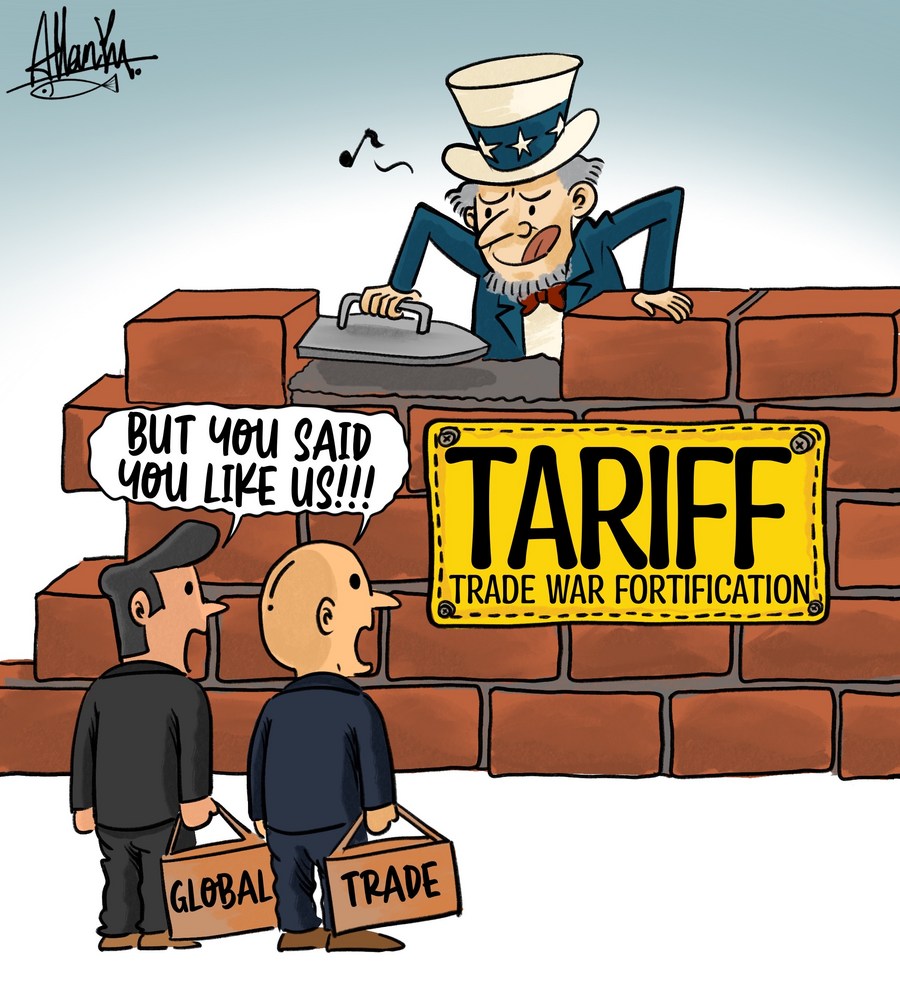Trump's Tariffs: The IMF's Assessment Of The Economic Fallout

Table of Contents
The IMF's Methodology and Data Sources
The IMF employed a robust analytical framework to assess the impact of Trump's tariffs. Their analysis relied on a combination of econometric modeling and the utilization of various data sources. These sources included extensive trade statistics from member countries, macroeconomic indicators such as GDP growth and inflation rates, and data on industry-specific production and employment.
- Econometric Models: The IMF utilized sophisticated econometric models, incorporating variables such as tariff rates, trade flows, and macroeconomic conditions, to simulate the effects of the tariffs on various economic indicators. These models attempted to isolate the impact of tariffs from other contributing factors to economic change.
- Data Collection Methods and Limitations: Data was gathered from a variety of sources, including national statistical agencies and international organizations. However, limitations existed, such as data lags and potential inconsistencies across different reporting methodologies. The IMF acknowledged these limitations in its reports.
- Transparency of the IMF's Analysis: The IMF generally maintained transparency in its analysis, publishing detailed reports and methodologies, allowing for scrutiny and further research by academics and policymakers. This transparency is crucial for building trust and ensuring accountability.
Global Trade Disruption Caused by Trump's Tariffs
The IMF's assessment revealed a significant disruption to global trade volumes resulting from Trump's tariffs. The impact was felt across numerous countries, with major trading partners like China and the European Union experiencing particularly substantial consequences.
- Quantifying the Reduction in Global Trade: The IMF estimated that Trump's tariffs led to a measurable reduction in global trade volume, although the exact figures varied across different reports and model specifications. The reduction was not solely limited to the direct impact on the targeted goods but also included ripple effects across global supply chains.
- Sectors Most Severely Impacted: The agricultural sector and manufacturing industries, particularly those involved in the production of steel and aluminum, suffered disproportionately. These sectors were directly targeted by many of the tariffs imposed.
- Implications for Global Supply Chains: The tariffs disrupted established global supply chains, leading to increased costs, delays, and uncertainty for businesses. Companies were forced to re-evaluate their sourcing strategies, leading to increased costs and potentially shifting production to other regions.
Impact on Specific Sectors and Industries
The IMF's analysis detailed the effects on various sectors, offering insights into both the short-term and long-term consequences. Specific impacts differed based on industry characteristics and global market position.
- Job Losses and Gains: While some industries experienced job losses due to reduced competitiveness, others saw potential gains as domestic production increased due to the tariffs. However, the net effect on employment was largely negative, according to the IMF’s assessments.
- Price Increases for Consumers: Consumers faced price increases for goods affected by the tariffs, reducing purchasing power and potentially contributing to inflationary pressures. This negative impact was widespread, impacting households across income levels.
- Impact on Competitiveness: The tariffs reduced the competitiveness of affected industries in the global marketplace, hindering their ability to export goods and compete with foreign producers.
Overall Economic Impact and Growth Slowdown
The IMF's assessment concluded that Trump's tariffs had a negative impact on global economic growth. Their predictions indicated a measurable reduction in GDP growth, with spillover effects impacting various economies worldwide.
- Reduction in Global GDP Growth: The IMF quantified the reduction in global GDP growth attributed to the tariffs, although the exact magnitude varied depending on the model and assumptions used.
- Impact on Inflation and Investment: The tariffs contributed to inflationary pressures and reduced business investment due to uncertainty and higher input costs. This negatively impacted long-term economic prospects.
- Ripple Effects on Other Economies: The impact was not limited to the United States; trading partners experienced negative ripple effects, leading to reduced economic growth and potentially triggering retaliatory measures.
Policy Recommendations and Mitigation Strategies
The IMF offered policy recommendations to mitigate the negative consequences of Trump's tariffs. These recommendations emphasized the importance of fostering international cooperation and promoting free trade.
- Promotion of Free Trade Agreements: The IMF advocated for the expansion and strengthening of free trade agreements to reduce trade barriers and promote open markets. This approach would increase global trade and reduce negative impacts.
- Investment in Affected Sectors and Worker Retraining: Investments in affected sectors and worker retraining programs were recommended to help workers transition to new jobs and industries. This aims to mitigate the negative social consequences of trade disruptions.
- Strategies for Strengthening International Cooperation: The IMF stressed the importance of enhanced international cooperation to address trade disputes through dialogue and multilateral mechanisms. This helps foster a more stable and predictable global trading environment.
Conclusion
The IMF's assessment of the economic fallout from Trump's tariffs clearly indicated negative impacts on global trade, specific industries, and overall economic growth. The reduction in global trade volumes, price increases for consumers, and disruptions to supply chains underscored the detrimental effects of protectionist trade policies. The IMF's policy recommendations, focusing on free trade agreements, investment in affected sectors, and international cooperation, highlight the need for a more balanced and collaborative approach to global trade. Understanding the long-term consequences of protectionist trade policies like Trump's tariffs is crucial. Further research into the IMF's analysis of Trump's tariffs and the broader implications of trade wars is essential for informed economic policymaking. Continue to explore the impact of Trump's tariffs and the IMF's assessment to better understand the complexities of global trade.

Featured Posts
-
 Bfm Bourse Informations Cles Du Marche Du 17 Fevrier A 15h Et 16h
Apr 23, 2025
Bfm Bourse Informations Cles Du Marche Du 17 Fevrier A 15h Et 16h
Apr 23, 2025 -
 Suriye De Ramazan Bayrami Kutlamalari Pazartesi Basliyor Tuem Bilgiler
Apr 23, 2025
Suriye De Ramazan Bayrami Kutlamalari Pazartesi Basliyor Tuem Bilgiler
Apr 23, 2025 -
 Proposed V Mware Price Hike Sparks Outrage At And T Faces 1050 Increase
Apr 23, 2025
Proposed V Mware Price Hike Sparks Outrage At And T Faces 1050 Increase
Apr 23, 2025 -
 Shota Imanagas Dominating Splitter Analyzing The Cubs Left Handed Weapon
Apr 23, 2025
Shota Imanagas Dominating Splitter Analyzing The Cubs Left Handed Weapon
Apr 23, 2025 -
 Ftc Challenges Microsofts Activision Blizzard Acquisition
Apr 23, 2025
Ftc Challenges Microsofts Activision Blizzard Acquisition
Apr 23, 2025
